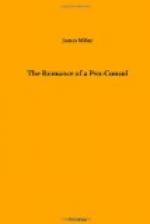‘Landing with his battery of muskets,’ Sir George had the tale, ’Hongi lost no time in carrying slaughter through Maoriland. His lurid fame spread far and wide; his bill of slaughter grew bigger and bigger. Yet, he met his death by a stray shot. Te-Whero-Whero, another Maori chief, complained to me, while we were discussing Hongi, that it was quite unfair he, should have been cut down in that fashion. When a veteran warrior could be destroyed, almost by accident, to the gun of a nobody, then all honest fighting was at an end. “You should,” I was earnestly counselled by Te-Whero-Whero, “not let Maoris have arms which lend themselves to such ways."’
One English gift Hongi had not converted into muskets, a suit of armour that had probably been in the Tower of London. ’Another chief near Wellington’—Sir George stated this item arising out of Hongi—’had been given the armour, either to inspect or to keep. Anyhow, his interest took the form of hanging it on a tree, and firing at it. The bullet, it was alleged, penetrated the armour, and a native ran to Wellington with the report that the chief had been shot. That was incorrect, for he wisely wanted to test the armour before trusting himself in it. But the English settlers, just beginning to arrive in Wellington, were disturbed lest the tribe should fall foul of the representatives of a country which has produced so treacherous a suit of mail.’
Knowledge of arms, on the part of the Maoris, had advanced; indeed, they were in no wise tardy to pit themselves against British troops. Their own success, or rather the want of success of the British, had brought about this state of feeling. Careful, direct study of the situation, upheld Sir George in the intuition that he must strike firmly at the rebellion, and take every civil step that would tend to lay it. He stopped the sale of arms to the natives, though for another reason than that advanced by Te-Whero-Whero. Some fancied that his action might occasion discontent, if not revolt, among the friendly Maoris. ‘Well,’ was his answer, ’if that is a risk, we must run it.’
He gripped the nettle of land dealing, as between whites and natives, admonishing: ’The State shall conduct it. Then, it will be seen what the Maori has to sell, and the European will be made certain of a proper title. We shall have a regular system, the State standing between the parties to secure that all is fair. Thus friction may be avoided.’ Again, Sir George organised a native police force, which paid a double debt. It not only waited upon law and order, but exercised a civilising influence towards the Maoris, through those who were trained in its ranks. That aim was at the end of all his plans; every road was marked ‘To Civilisation.’
Next, Sir George took the field. By accompanying the soldiers, he was able to gain a variety of advantages. He was at hand to sanction what steps might be necessary, an advance on cumbrous despatch writing. His presence was especially valuable when sea and land forces happened to be co-operating. He could order both, being Governor, Commander-in-Chief, Lord High Admiral, and everything else, in New Zealand. Finally, he could speak, face to face, with the Maoris, friends and enemies in the name of the Queen.




